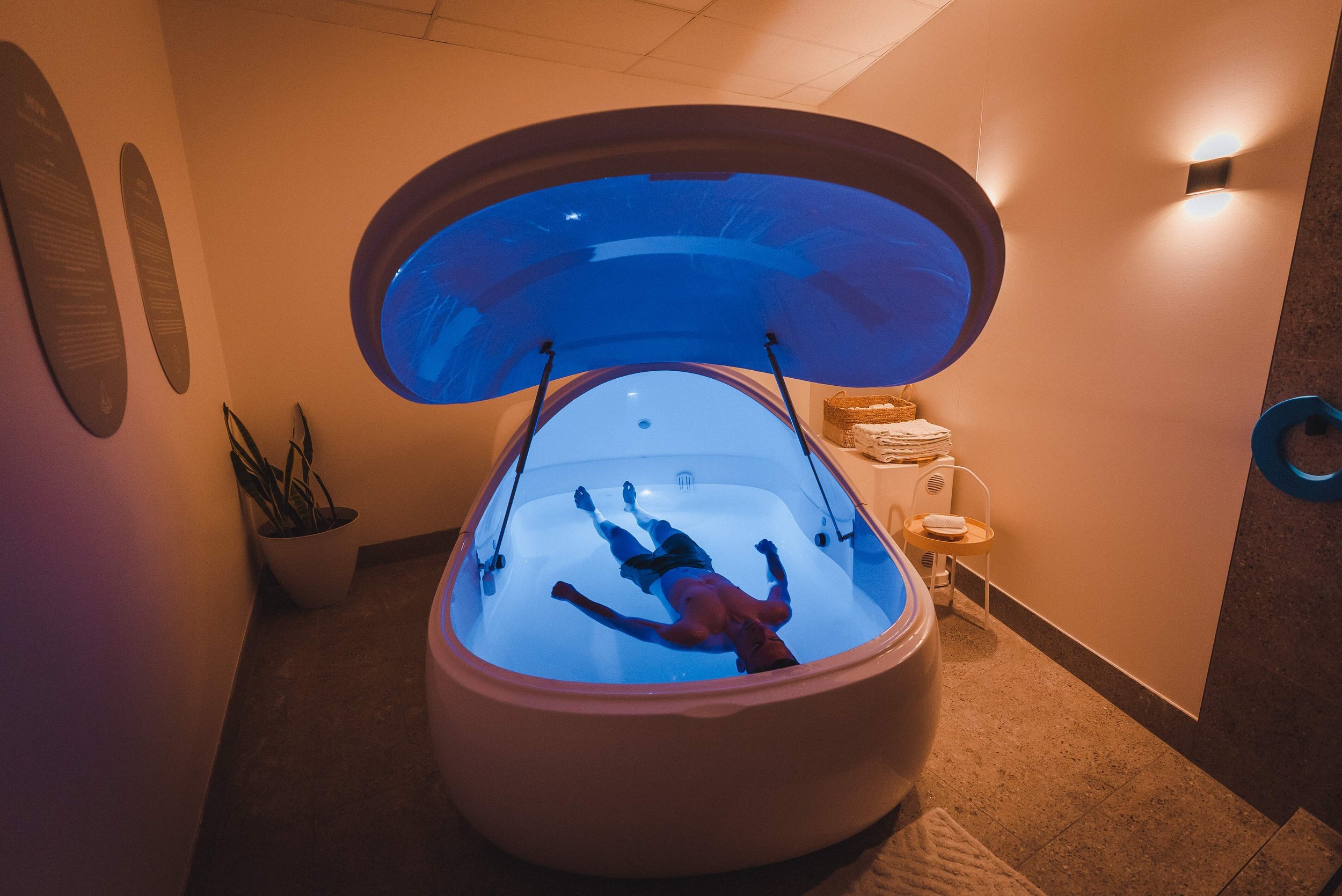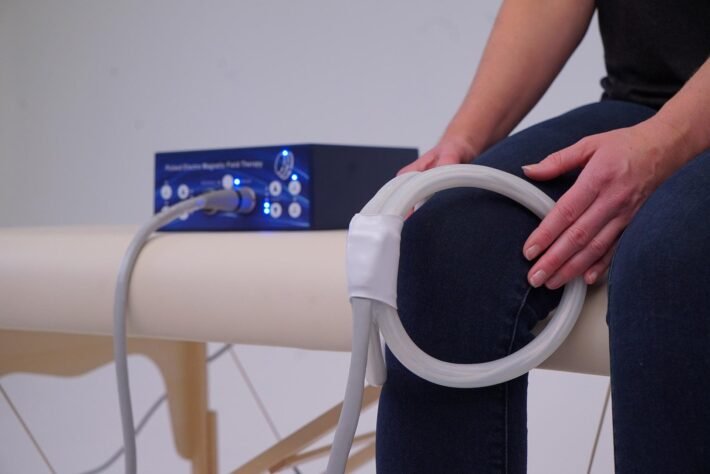
Experience The Benefits Of The R.E.S.T Centre
Why The R.E.S.T. Centre?
The R.E.S.T. Centre is dedicated to aiding you through your pain management journey and healing process. We offer various treatment therapies that provide a range of benefits, and we can help you find what works best for you and guide you toward the most effective treatments. Please explore the various benefits of our services below, take a look at the FAQ’s, or contact us for any questions or concerns. Your comfort is our top priority.
Here are some of the benefits of our services
Floatation Therapy
Relieve Stress and Anxiety
Alleviate Chronic Pain
Enhance Sleep Quality
Boost Cognitive Clarity
Accelerate Muscle Recovery
Support PTSD Management
Manage Migraines and Headaches
Improve Skin Health
Boost Creativity and Mindfulness
Support Mental Health
PEMF Therapy
Chronic pain conditions
Muscle discomfort and soreness
Sports injuries
Post-operative healing and surgical recovery
Joint issues (e.g., stiffness, limited mobility)
Bone health
Stress and anxiety
Sleep disorders and insomnia
General relaxation and rejuvenation
Low energy levels
Inflammation reduction
Improved blood circulation
Cold Plunge & Infrared Sauna Therapy
Accelerate muscle recovery after workouts
Enhance circulation and cardiovascular health
Relieve muscle tension and reduce inflammation
Boost metabolism and promote detoxification
Support joint mobility and alleviate stiffness
Improve skin health and complexion
Balance energy levels and reduce stress
Red Light Therapy
Stimulate collagen production for smoother skin
Reduce the appearance of fine lines and wrinkles
Accelerate wound healing and tissue repair
Alleviate joint pain and muscle soreness
Enhance mood and combat seasonal affective disorder
Improve sleep quality and circadian rhythms
Massage Therapy
Relieve muscle tension and ease pain
Improve circulation and lymphatic flow
Enhance flexibility and joint mobility
Reduce stress and promote relaxation
Alleviate headaches and migraines
Enhance overall mood and mental well-being
Found a Treatment That Sparked Your Interest?
Flotation Benefits for Healing and Wellness
Athletic Performance Optimization | Sports Injury Recovery
It doesn’t matter if you’re training to climb Mount Kilimanjaro or you’re satisfied with your stair climber, athletes of all abilities can reap the physical and mental rewards of floating.
Whether you’re a weekend warrior, a professional athlete or somewhere in between, you’re familiar with the uncomfortable side effects of lactic acid. It’s produced in the muscle tissues during strenuous exercise and can result in muscle ache, cramps and weakness, as well as rapid breathing, nausea and vomiting.
Floating can help you bounce back from that kind of strenuous exercise faster. The Epsom salt in the water literally takes the weight off your muscles and joints. It helps dissipate the lactic acid buildup in sore muscles following a workout to reduce overall muscle stiffness and pain.
With additional benefits like muscle tone stimulation and injury prevention/recovery, it’s no surprise NFL teams like the Seattle Seahawks and New England Patriots have incorporated floating into players’ training regimens. NBA superstar Steph Curry of the Golden State Warriors credits floating with recovery and even took an ESPN film crew with him to a float spa to share its many benefits.
Exercise is as much a mental activity as it is physical and because there’s nothing to distract your mind, floating is also the perfect environment to practise visualization. The powerful and creative tool uses the imagination to create visions of what we want in our lives and how to make them happen. An athlete, for instance, might practise visualization to take their performance to the next level.
Floating yields the same benefits for athletes of all types. Whether you’ve had a particularly heavy gym session or want to fast track your recovery following a marathon, floating gives your muscles a break and a boost that can’t be found elsewhere.
Migraines | Headaches | Concussion Recovery
The Dead Sea in Israel is renowned for its healing properties, but you don’t have to travel far to experience the same benefits of magnesium-saturated water.
Migraines are among the most disabling chronic medical disorders and the discomfort that accompanies them extend beyond physical symptoms. Many sufferers miss work and social events because the pain is so severe and when they’re not experiencing a migraine, they live in fear of their next attack. Migraines are also associated with depression.
Studies show half of migraine sufferers have low levels of magnesium, a natural mineral that helps keep blood pressure stable, promotes heart health, regulates nerve and muscle function, and builds bone, DNA and protein.
Migraine Canada reports a lack of magnesium may contribute to headaches and migraines and says some people use magnesium to treat and prevent migraine symptoms, include a several headache, visual disturbances, sensitivity to light and sound, and nausea and vomiting.
Though it can be ingested as a nutritional supplement, a wide variety of factors – including the individual chemistry of a person’s stomach acid – can interfere with magnesium’s effectiveness, the Universal Health Institute warns. “Therefore, soaking in an Epsom salt bath is one of the most effective means of making the magnesium your body needs readily available,” it says.
Researchers at the University of Birmingham in the UK found regular skin exposure to Epsom salts improves the mineral content in the bloodstream within just a few hours. Large-scale saturation of the skin produced optimum results – meaning you should go ahead and soak it in. The body will absorb what it needs from the float session and dispose of any excess.
According to a study conducted at University of California, Irvine, a research university, floatation therapy is a “long-lasting and versatile treatment” for chronic tension headaches.
Floatation therapy also helps the healing process of concussions by helping the brain to reset and recharge, thus facilitating the healing process. The brain can connect with other parts of the brain to clean out waste and inflammation, getting rid of unwanted nerve connections and other restorative processes.
Pain Relief | Pain Management
Say goodbye to nagging pain that’s the result of work-related and other injuries, or conditions like arthritis, osteoporosis, fibromyalgia, tendinitis, bursitis and inflammation.
Numerous studies have explored the therapeutic benefits of floating and many highlight its success in reducing and managing pain. Some of the earliest research found significant benefits among people suffering from osteoporosis and rheumatoid arthritis. Floating is also proven helpful to people with fibromyalgia, a chronic medical condition that often arises after physical trauma.
In a study conducted by the Fibromyalgia Floatation Project, floating was found to reduce stress, pain, muscle tension and anxiety while improving sleep, elevating mood and increasing magnesium levels within the body. Studies also confirm a regular float practice reduces Premenstrual Syndrome symptoms as well as their severity.
Why is floating such a good remedy for chronic and acute pain? For starters, the float pod is filled with water that contains Epsom salts, creating a level of buoyancy that gives your body a break from the effects of gravity. Muscles relax, your spine lengthens and pressure on your joints is released. Aaaah…just the thought is intoxicating!
Epsom salts contain essential minerals like magnesium, which are absorbed through your skin and dramatically increase blood flow throughout your entire body. In turn, your muscles receive greater amounts of oxygen and your mind begins to enter the theta brainwave state, which is one step before deep sleep and an optimal state for healing.
Magnesium is a natural anti-inflammatory and though it’s an essential mineral, the body can’t produce it. Magnesium deficiencies are associated with osteoporosis, migraine headaches and other serious health conditions. Floating gives the body access to this powerful mineral in a safe and effective manner.
Because many chronic pain sufferers are constantly in a state of stress as their body reacts to pain, they also benefit from the absence of external stimulation. That puts the sympathetic nervous system at ease and reduces or stops the fight-or-flight response. Eliminating or coping with stress better can help decrease sensitivity to pain.
Stress Reduction | Anxiety | Depression | PTSD
By activating our ‘rest-and-digest’ mode and putting our ‘fight-or-flight’ response on hold, floating allows our body and mind to heal from the stresses of modern living.
When Australian soldier Michael Harding was medically discharged from the army with post traumatic stress disorder (PTSD) following a tour of duty in Afghanistan, he was withdrawn, unemotional and suffered from debilitating nightmares and night sweats. He tried talk therapy, medication, yoga, meditation and medicinal pot but his anxiety and muscle spasms continued.
On the encouragement of his wife, Michael agreed to try floating, even though he thought it sounded like a “sham.” He fell asleep during his first float and awoke feeling refreshed. By three floats, his anxiety and hyper-vigilance had subsided. By three months, his night sweats had also subsided. In an article about floating published in TIME magazine, the former soldier also reported feeling more confident as a result of floating.
That same article explored the work of scientists like neuropsychologist Justin Feinstein, founder of the Float Clinic and Research Center at the Laureate Institute for Brain Research in Oklahoma. He and his team have found that floating tamps down anxiety in the brain in a way that rivals some prescription drugs and meditation.
A February 2018 study published in the PLOS Journal found that a mere one-hour float significantly reduced anxiety, stress, muscle tension, pain and depression while increasing feelings of serenity, relaxation, happiness and overall well-being.
The Human Performance Laboratory at Karlstad University in Sweden has studied floating for more than two decades. Its research shows numerous benefits, including diminished pain from chronic muscle tension, reduced anxiety, depression and stress, as well as increased energy.
“After flotation, people are happier, sleep better and consume less alcohol and medicine,” its research says. Many people experience a deep sense of rest and relaxation, which gives the body time to re-establish its relaxation response. “Relaxing in the flotation tank leads to a sense of subtly changed consciousness, an experience of the present moment or mindfulness, which is the opposite of our usual states of stress.”
How does floating help us reduce stress? First, the water’s magnesium inhibits ACTH, a hormone that drives your adrenal glands to release the stress hormone cortisol, while allowing your body to release large amounts of endorphins (which offer pain relief) and dopamine (a.k.a. the ‘feel-good’ neurotransmitter). Magnesium also improves sleep quality, which contributes to feeling less stressed.
Next, floating’s unique environment is free of external stimulation, which is proven to increase feelings of serenity and relaxation while decreasing feelings of anxiety and tension – which last long after your session is finished. At the same time, the buoyancy you enjoy allows the chronic muscle and joint pain you feel to ease as your body begins to recover naturally.
Improved Sleep
If you suffer from insomnia or struggle to sleep because you work shifts, you’re likely envious of people who sleep like a baby. Floating releases natural dopamine and endorphins so you can finally do the same!
There are lots of good reasons why sleep is so important. It allows us to be more productive, improves our ability to concentrate, lowers the risk of gaining weight and heart disease, improves athletic performance, helps prevent depression, lowers inflammation, improves our social and emotional intelligence, and can help our bodies fight off infections.
Though we rightfully crave a good night’s sleep, chronic insomnia is the most common sleep disorder and can affect any age, including children. Thankfully, floating can heal the systems that can disrupt our sleep, enhancing both the quantity and quality of sleep so we can experience its many benefits without the need for medication.
By significantly reducing the external presence of sensory information – which includes everything from sight, sound and smell to touch, temperature, taste, sense of body position and even sense of gravity – float therapy quiets activity in the central nervous system and relaxes the body and mind, explains ‘sleep doctor’ Dr. Michael J. Breus, a clinical psychologist who specializes in sleep disorders.
Many people struggle to sleep because of cortisol, the hormone our body produces in response to stress. When faced with a stressor of any sort, our body produces a sharp increase in cortisol and when stress is routine, the hormone remains high. Too much cortisol creates other health issues, including poorly regulated blood sugar, suppression of the immune system, weight gain, gastrointestinal issues like irritable bowel syndrome, and chronic anxiety. High cortisol levels typically go hand in hand with diminished levels of melatonin, a hormone that helps lull us to sleep each night.
Floating also provides benefits from magnesium-rich Epsom salt. Among other things, the magnesium stabilizes sleep-wake cycles. Our bodies don’t produce magnesium so we must take it in from outside sources. Many people who float report having much better sleep following a session – even if that’s not their primary reasons for floating.
Floating can also be used to alleviate feelings of jet lag caused by changes in time zones or reset sleep schedules. Our bodies are in tune with circadian rhythms and don’t easily adapt to abrupt, unnatural changes in time. Many people have found floating is one of the best ways to quickly and comfortably reset their circadian rhythms.
The R.E.S.T. Centre offers evening slots, which is a great time for people suffering from acute sleeping problems to float. Regardless of the time of day you float, it will reduce your anxiety and stress – a powerful sleep aid you’ll appreciate.
Meditation | Super Learning | Breaking Bad Habits
Floating unleashes powerful theta brainwaves so you can enjoy the countless benefits of meditation, such as profound healing, learning and personal growth.
Floating enhances meditation, a centuries-old practice that involves training one’s mind to find peace and calm, and to sit quietly without distraction or worry. Study after study shows meditation brings a wide range of mental and physical benefits to its practitioners, including lessened anxiety, depression and pain. It has also been shown to improve learning and memory, and help individuals quit smoking.
It stands to reason floating can enhance meditation. After all, it removes distractions and helps people connect with their body’s rhythms in new and profound ways – a key component of some forms of mediation. For those who suffer from muscle tensions or aching joints that make sitting still painful or difficult, the weightless sensation of a float tank can make meditation more comfortable.
Diehard meditation practitioners say the float tank is an excellent environment for moving them to a profoundly deeper meditative state in a shorter period of time. An article in the Yoga Journal even questions if floating is the new meditation.
Float tanks help to activate theta brainwaves, which typically occur briefly before sleep and again at waking. Theta brainwaves are known for vivid imagery and creative inspiration – or, as Oprah would say, those ‘a-ha’ moments. While in the theta state, the mind is capable of deep and profound learning, healing and personal growth.
That profound learning is known as ‘Super Learning.’ With greater resources at its disposal, the mind can absorb new material very deeply, with research showing enhanced memory and recall activities. Learning capacity is also enhanced through improved problem solving, speed of thought and increased creative spurts. Floating is helpful in developing mental clarity, focus, personal motivation and productivity, making it a great tool when preparing for things like an exam or a presentation.
Super Learning can also lead to stronger self-awareness, allowing people to achieve a greater understanding of their patterns of behaviour. Many people credit floating with helping them successfully overcome obesity, smoking and drug addiction.
FAQ’s
-
Floatation Therapy was invented by Dr. John C. Lily who was an American physician, neuroscientist, psychoanalyst, psychonaut, philosopher, writer and inventor.
-
We generally provide everything you need (earplugs, towels, shampoo & body wash). You may wish to bring a brush, bathing suit, and a safe place to put glasses or contact lenses while you are in the tank. We provide a post float room complete with a make up station, blowdryer and mirror.
-
A. We recommend the following to all floaters both new and experienced:
– Do not drink caffeine (coffee, tea, pop or sports drinks) 3 hours prior to floating
– Do not shave any body parts the day of floating as the salt water can irritate freshly shaven skin
– Eat a light meal 1 hour to 90 minutes prior to floating
-
PEMF therapy is effective for chronic pain, muscle discomfort, sports injuries, and stress reduction, and more. Learn more about what our treatments can help with on our service pages.
-
These therapies improve complexion, skin tone, and overall skin health through increased blood flow and detoxification. Learn more on our service pages.
-
Yes, red light therapy is non-invasive and generally well-tolerated by individuals with sensitive skin.
Visit the R.E.S.T. Centre
Visit our location:
Location: 1916 Dundas East, Unit 7 Whitby, Ontario
Hours: 7 days a week, 10 am - 12 am























